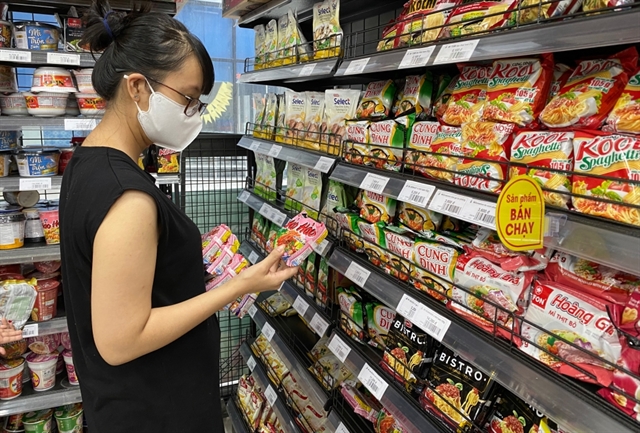The Ministry of Industry and Trade is verifying information regarding instant noodle products from Viet Nam that have received warnings in the European Union (EU) due to Ethylene Oxide (EO) residue that exceeds the bloc's regulatory threshold.

The Ministry of Industry and Trade is verifying information regarding instant noodle products from Viet Nam that have received warnings in the European Union (EU) due to Ethylene Oxide (EO) residue that exceeds the bloc's regulatory threshold.
A representative of the ministry was quoted by Viet Nam News Agency as saying that among three warnings, only one case was found to have EO residues exceeding the allowed threshold in Germany, and there is a high possibility that this batch was exported to the EU last year, before shipments were subject to EO regulations.
There were three warnings, in Germany, Poland and Malta, according to an announcement by the Vietnam Office of Notification and National Enquiry Point on Sanitation, Epidemiology and Phytosanitary (SPS Viet Nam) under the Ministry of Agriculture and Rural Development.
Specifically, Germany warned that chicken and curry-flavoured instant noodles from Asia Food Joint Stock Company in Thuan An City, Binh Duong Province, was found to have EO residues higher than EU’s allowed level.
Poland warned about chicken-flavoured instant noodles from Viet Nam Food Industry Joint Stock Company in Tan Phu District, HCM City, adding that the country returned the shipment.
Malta warned that Nguyen Gia-branded noodle products were identified as being produced from illegal genetically modified rice, adding that it took measures to monitor and recall the products. In response, the ministry’s Department of Science and Technology asked producers to be responsible for meeting the requirements of import markets.
Regarding the warning in Poland, the department said that the shipment was returned due to inadequate import dossiers.
On Germany’s warning, the department said there was a high possibility that the batch was exported in 2021, before EO needed to be checked in exports.
Since February 17, the EU required certification for each batch of instant noodle products imported into this bloc. All shipments after this date were subject to EO control and none were returned, according to the department.
The requirement was raised after some instant noodle products of Viet Nam were recalled in the EU, due to EO residue exceeding the allowed threshold in August 2011.
From June 13, the EU removed dry noodles, vermicelli and pho without spices from the list of products subject to special control in the EU. Instant noodles which contained spices and additives were still subject to a 20 per cent inspection frequency and must have a food safety certificate when exported to this market.
The department said in the future the focus will be on taking large-scale samples of instant noodle products in the domestic market, especially those with seasoning, to access EO residue and establish a limit for this substance.
Currently, the EU’s EO threshold is 0.01mg/kg.
The ministry urged enterprises to study the technical requirements of export markets carefully to avoid violations, adding that each market had different requirements for each food product.
After the EU’s warning in August last year, the ministry implemented an inspection of several instant noodle production companies, as well as supply chains, and found that enterprises wholly complied with the established regulations about food hygiene and safety.
The ministry will continue to provide support to enterprises to improve measures to ensure food hygiene and safety and meet the technical requirements of foreign markets.
Research will continue in assessing chemicals which appear on food products. Those found to be harmful to human health will receive appropriate management measures, the ministry said.
According to SPS Viet Nam, from January to July 22, the EU Rapid Alert System for Food and Feed sent 2,531 alerts. Viet Nam received 50 warnings about agricultural and food products. — VNS





